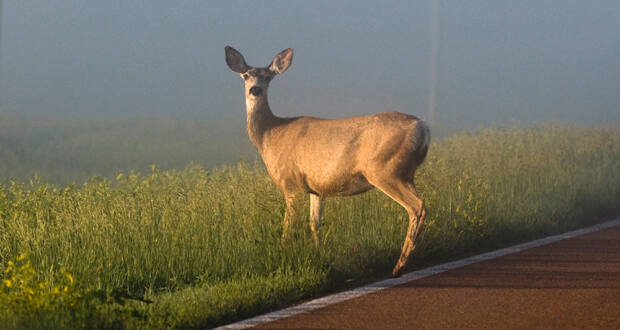Mating season and the quest for more secure habitat have deer on the move this time of year, increasing the chances of vehicle-deer collisions.
Typically, the greatest number of vehicle-deer crashes are in mid-November when the rut, or mating season, peaks. In addition to the rut, deer are also on the move in mid-fall seeking new food sources and shelter as crops are harvested and leaves fall from trees and shrubs, leaving them less secure than in their summer habitats.
READ: Kansas City fired up for opening of Museum of BBQ at Crown Center next spring
Missouri, Kansas are high risk
Kansas and Missouri are considered “high-risk” for auto crashes involving deer. Nationwide, more than 200 people each year are killed in a collision with a deer.
According to the Kansas Department of Transportation, deer-related (crashes in which a deer and vehicle actually collided, or the presence of a deer was a contributing circumstance) average over 10,000 per year. The highest number of crashes typically occur where there are the most vehicles.
In Missouri it’s a similar story. Figures show that on average, three people are killed each year in Missouri from deer encounters with moving vehicles, while another 300 are injured.
In Missouri, October and November are the months with the most collisions, with about double the risk of other months. November, with nearly 20% of all collisions, is the most dangerous month.
Both the Missouri and Kansas Highway Patrol (KHP) caution drivers to refrain from making exaggerated maneuvers to avoid a deer in the road, lest a bad situation become even worse.
READ: Election workers are vital to election integrity
Tips for safety and response
The agencies recommend the following to help motorists avoid crashes with deer:
- Be especially watchful at dawn and dusk, when deer are more active.
- If you see one, watch for others, as they seldom travel alone.
- Reduce speed and be alert near wooded areas or green spaces, such as parks and golf courses, and near water sources such as streams and ponds.
- Deer crossing signs show areas where high numbers of vehicle/deer crashes have occurred in the past. Heed these warnings.
- Use bright lights when there is no oncoming traffic and scan the road ahead of you.
- Don’t swerve to avoid hitting a deer—the most serious crashes sometimes occur when motorists swerve and collide with another vehicle or run off the road and hit an obstacle.
- Always wear a seat belt and use the appropriately-fitted child safety seats—they are your best defense should you be involved in a crash.
- Honk your horn with one long blast. A long blast on your horn may frighten large animals away from your vehicle. The Insurance Information Institute (I.I.I.) advises against relying on devices such as deer whistles and reflectors, which have not been proven to reduce collisions with animals.
If you do strike a deer, here are some additional tips:
- Slow down, move your vehicle to the shoulder if possible, and call for law enforcement. KHP dispatch can be reached at *47, Kansas Turnpike at *KTA, and local law enforcement at 911. Make sure you tell the dispatcher if the animal or your vehicle is still in the road.
- If you hit a deer or other animal, do not worry about removing the animal. Law enforcement can remove the animal from the road when they arrive. Don’t go near a wounded animal. A frightened and wounded animal can be unpredictable.
- Turn on your hazard lights and remain buckled up inside your vehicle. You are more protected this way, should a secondary crash occur.
- If you must be outside your vehicle, make sure it is as far off the road as possible, and do not stand between your vehicle and another one. Keep children buckled, and in car seats in the vehicle. Be vigilant and watch traffic to ensure they aren’t getting close to you.
Anyone involved in a vehicle-deer crash resulting in personal injury or property damage that totals $1,000 or more is required to immediately report the crash to the nearest law enforcement agency. Failure to report any traffic crash is a misdemeanor and may result in suspension of driving privileges.
A salvage tag is required to remove a deer carcass, or any part of the carcass, from the crash site. Tags can be issued by KHP troopers, sheriff’s deputies, or KDWPT game wardens.
–Lee Hartman | Metro Voice Photo: Kansas Department of Wildlife, Parks & Tourism
